
Like many college graduates, I left undergrad and started completely fresh — I moved 1,000 miles from Los Angeles to Albuquerque, New Mexico, where I knew nearly no one.
I was determined to find a church where my own faith as a Christian could grow and mature, now that I was officially an “adult” with a job and my own apartment, but I had absolutely no idea where to start. Although I had grown up in church, and gone to a Christian college, I’d never connected with a faith community on my own. Now that I wasn’t just tagging along with my parents to church or heading to chapel at my university, I had a lot of decisions to make when it came to finding a spiritual home.
It wasn’t immediate, but I found my “people,”—a local church where I just seemed to fit. Men in cowboy hats and belt buckles worshipped alongside trendy college students and young families; elderly people and exchange students mingled while sipping coffee in the crowded lobby. The pastor spoke words of compassion and my soul rejoiced with every sermon. I was a young, single professional, and people remembered my name after only a few times returning. Eleven years later, I’m still a member of the same church, where I met and married my husband and have cultivated some truly wonderful friendships.
It may seem difficult to find a place where you feel like you belong, especially if you’re starting pretty much from scratch. But I’m here to tell you that it can be done! Here are five encouraging tips as you begin your search for a faith community.
1. Try (almost) everything
When looking for a spiritual community, it might be tempting to seek out the type of church you’re familiar with or a community that looks similar to the one you’re used to. Make a (short) list of what you’re hoping for, but don’t be afraid to explore beyond that. My childhood church was very performance-oriented—there was a large focus on having a great music experience, but the church I ended up finding after college had a smaller choir with a more acoustic style. Finding a community is about so much more than what kind of church service appeals to you, it’s about a shared faith in God, the people you meet and connect with, and serving others in love.
Don’t be completely closed off to the idea of something less traditional than a standard church service either—there are connections to be made and community to be had at food banks, community gardens, meditation centers, homeless shelters, and other places where people are serving others and exploring their spirituality as well!
2. Put yourself out there
Give of yourself in your search. Instead of showing up to a gathering or service and sitting in the back, then sneaking out before it’s over, introduce yourself to someone new. Yes, this requires some effort, but the benefits can be great.
The first few times I walked into my small church, there was an older man at the front doors, greeting everyone as they entered. He had an infectious smile and looked each person directly in the eyes, welcoming them to the service. I was nervous and wasn’t expecting to talk to anyone, but he shook my hand as I entered and spent a few minutes asking me about my story. I was awkward and uncomfortable, but the next week I came, he remembered me and introduced me to a whole group of people my age—some of those people are still my friends today, more than a decade later. And the man greeting everyone? Even my children now know and love him and his wife dearly—we swim and hang out at their house every week during the summer months. If I’d avoided his smile or didn’t engage in conversation, I don’t know that I would’ve been motivated to return to that church.
3. Give it a few chances
Before crossing a potential community or church off of your “maybe” list, go to at least two or three gatherings. This helps you feel out the community on more than one isolated occasion. There may be a substitute pastor or special events on the first time you chose to go, or maybe your first impression wasn’t quite right. If you want an accurate representation of the way a community works, give it a few tries and you’ll likely notice something new each time you visit.
4. Make a journal
With all your “shopping” for a church community, you may forget which places were your top priority and which ones you still wanted to check out. Make a journal where you list some of your favorite things about each place, or things you’re looking for the most in a faith community. After you’ve visited a new church, go back to your journal and use it to process your experience. Sometimes having things written down can allow for better insight and wisdom.
5. Remember what matters most
While we jokingly refer to finding a faith community as church “shopping,” an attitude of consumerism might lead us astray on our search. Oftentimes, we get stuck criticizing small or irrelevant details about a church, and we can forget that what’s important is finding people who we can practice our faith with—walking through the joys and hardships of life with others who will rejoice when you celebrate, and weep with you when you’re mourning. Not to mention the fact that going into a church with a self-serving or arrogant attitude will almost always leave us disappointed. But pushing our sleeves up and humbly asking where we can dive in and serve others will invigorate and encourage us as well. After all, it truly is better to give than to receive.
Originally published on August 24, 2018.